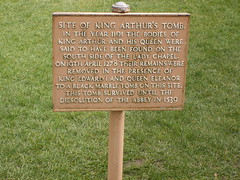King Edward I of England


King Edward I of England
(1239-1307)
King of England (1272-1307)
Family tree
Commemorated on 3 plaques
Site of King Arthur's Tomb. In the year 1191 the bodies of King Arthur and his Queen were said to have been found on the south side of the lady chapel. On the 19th April 1278 their remains were removed in the presence of King Edward I and Queen Eleanor to a black marble tomb on this site. This tomb survived until the dissolution of the abbey in 1539
Glastonbury Abbey, Glastonbury, United Kingdom where they was (1278)
This station stands on the site of the Great Hall of Berwick Castle. Here on the 17th November 1292 the claim of Robert Bruce to the Crown of Scotland was declined and the decision in favour John Baliol was given by King Edward I before the full Parliament of England and a large gathering of the nobility and populace of both England and Scotland.
Berwick-upon-Tweed railway station, Railway Street, Berwick-upon-Tweed, United Kingdom where they was (1292)
This fragment is the remains of the building where King Edward I held his parliament A.D. 1283 in which was passed the statute of Rhuddlan securing to the principality of Wales its judicial rights and independence.
High Street, Rhuddlan, United Kingdom where they held a parliament (1283)



